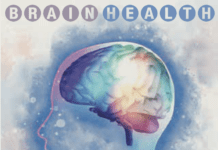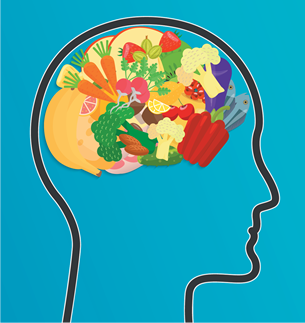Many of us have had moments when a name or word is frustratingly out of reach, or something is not where we’re sure we left it. The older we get, the more moments like these trigger concern about the health of our brains. Fortunately, there are things we can do to help support brain health—and a healthy diet is one of them.
A Healthy Brain. In the United States, it is estimated that 14 percent of people age 71 and older, and up to half of all people age 85 and older, may have some form of dementia—a loss of cognitive and physical functioning serious enough to interfere with everyday activities. Additionally, someone in the U.S. has a stroke every 40 seconds.
The two most common causes of dementia are Alzheimer’s disease and vascular dementia. In Alzheimer’s, certain proteins build up in the brain, interfering with brain cell connections and causing a loss of brain cells. Vascular dementia is caused by conditions, such as strokes, that block or reduce blood flow to the brain, leading to damage. The risk factors for this form of dementia are similar to those of coronary heart disease: for example, poor diet, physical inactivity, obesity, high blood pressure, high blood cholesterol, diabetes, and smoking. Addressing these risk factors is extremely important to maintaining brain health. Even in people with Alzheimer’s disease, a healthy vascular system may delay cognitive impairment and slow the rate of decline.
Diet Matters. Healthy blood vessels are essential to a healthy brain, and diet is key to healthy blood vessels. “The evidence suggests diet can be protective or detrimental regarding cognitive function and dementia,” says Claire Sexton, DPhil, director of scientific programs and outreach for the Alzheimer’s Association. “While it’s unlikely a single food or nutrient would have a significant beneficial effect, many observational studies find that an overall healthy dietary pattern is associated with lower risk of developing dementia and Alzheimer’s.”
One commonly studied dietary pattern for brain health is the MIND diet (Mediterranean-DASH Intervention for Neurodegenerative Delay). MIND is based on the heart-healthy Mediterranean and DASH diets, with some specific added recommendations. “The MIND diet emphasizes foods which are hypothesized to be beneficial to brain health, such as leafy greens, berries, and fish,” says Sexton. “Most of the data on the MIND diet—and diet and cognition in general—are observational, meaning we have not proven cause-and-effect. But interventional studies are underway to tease out the impact improving diet has on the brain.”
What to Do. “Research is clear that following an overall healthy dietary pattern has positive outcomes,” says Sexton, “not just for heart health and the body overall, but also for the brain.” While we wait for long term intervention studies to provide more specific advice, there is much we can do. Choose plenty of minimally processed, nutrient-rich plant foods (fruits, vegetables, nuts, seeds, beans, whole grains) and fish/seafood; avoid processed meats and other highly processed foods; keep sodium intake low; choose lean cuts of fresh meat (when you eat meat); and limit intake of refined carbohydrates and starches, sugary beverages, and sweets.
“Beyond diet, you can protect the health of your vascular system by engaging in regular aerobic activity, avoiding smoking, keeping blood pressure in the normal range, maintaining optimal blood sugar levels, keeping cholesterol levels in the ideal range, and working to achieve and maintain a healthy weight,” says Ayan Patel, MD, director of both the Cardiovascular Imaging and Hemodynamic Laboratory and the Women’s Heart Center. Keeping alcohol consumption moderate, getting adequate sleep, and finding ways to de-stress have also been associated with both cardio- and cerebrovascular health.
Try these tips to keep your brain sharp longer:
- “MIND” YOUR DIET: Eat more whole, minimally processed foods, like berries and other fruits, leafy greens and other vegetables, whole grains, nuts and seeds, and seafood—and less refined starches and cereals, added sugars and processed meats.
- KEEP ACTIVE: The brain benefits from physical and mental activity, like walking, reading, playing games, and remaining socially engaged.
- FOCUS ON HEART HEALTH: What’s good for the heart is good for the brain. Besides healthy eating and staying active, avoid tobacco, minimize alcohol consumption, get adequate sleep, and manage stress.


























I am a subscriber. Can you re-send information on ordering the book on Yoga in a chair for seniors.
Thank you
Please contact customer service: https://www.nutritionletter.tufts.edu/contact-us/
Apparently the consumption of seafood is recommended because of its Omega-3 fatty acids. A variety of plant-based foods, such as walnuts and avocadoes, are also rich in Omega-3s and they don’t contain the toxins and microplastics found in seafood. A real no-brainer!
Why isn’t it mentioned that certain medications also contribute to memory loss?